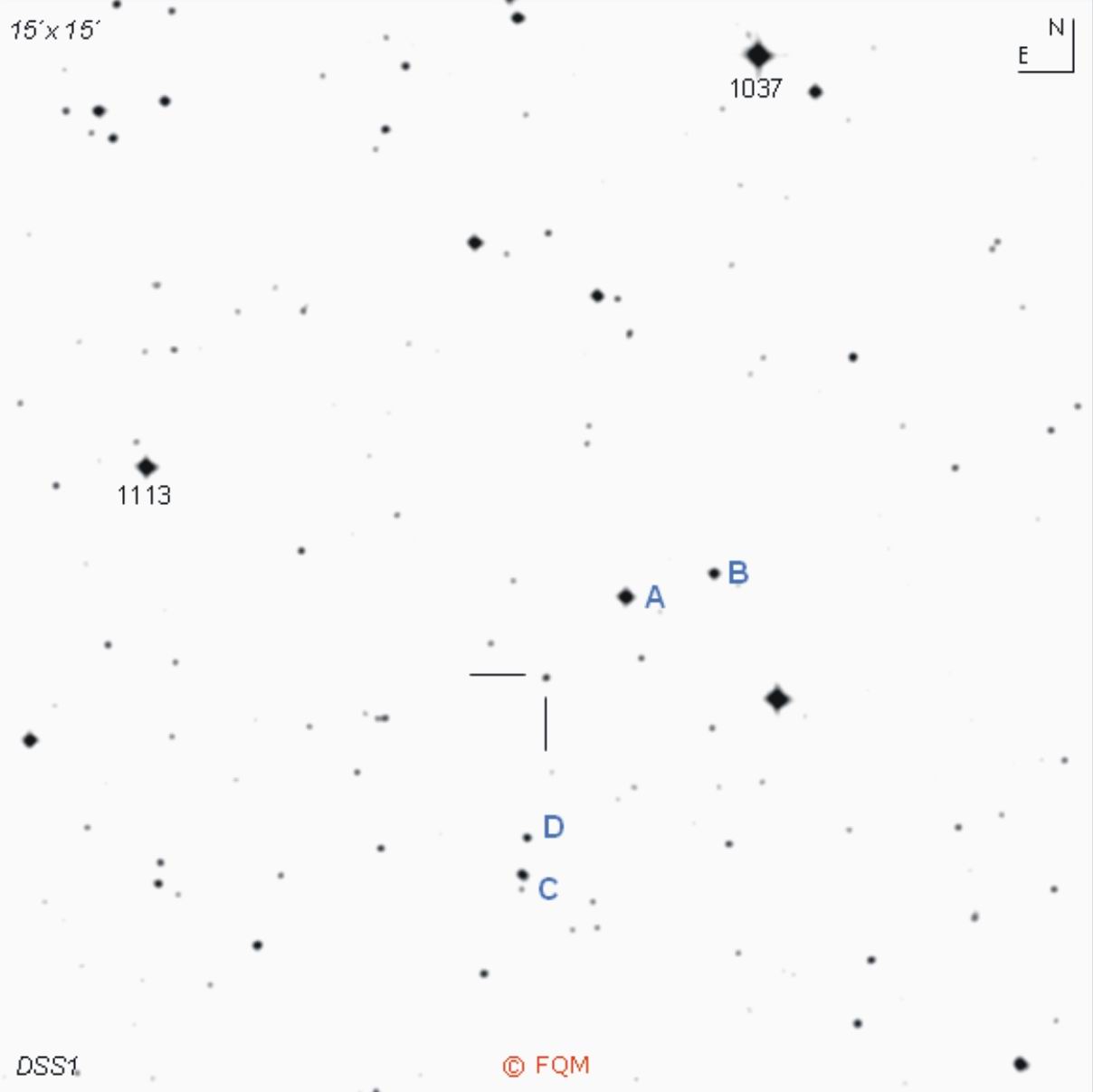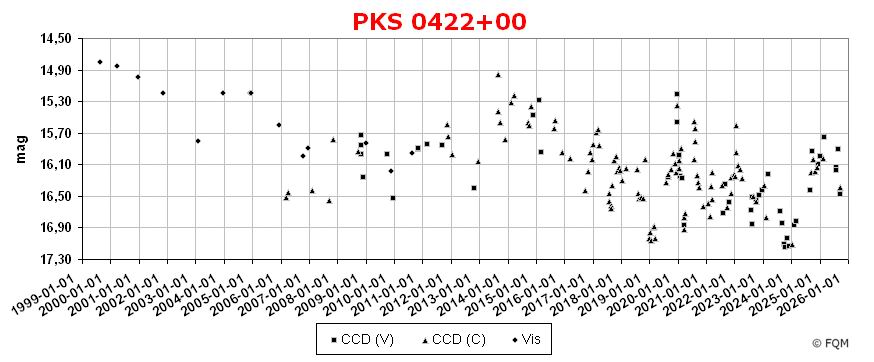
| Frankfurt Quasar Monitoring |
| PKS 0422+00 |
| Cross-Identifications | OF+038, OF 038, PKS 0422+004, PKS B0422+004 TXS 0422+004, GC 0422+004, QSO B0422+004 RGB J0424+006, VSOP J0424+0036, 0422+004 2MASS J04244684+0036062, 1E 0422.1+0029 87GB 042213.1+002922, MG1 J042447+0036 1RXS J042446.8+003559, QSO J0424+0036 |
| Equat. coordinates | RA 04 24 46.8 DE +00 36 07 (J2000) |
| Constellation | Taurus |
| Type | BL Lac |
| Redshift (2) | z=0.310 |
| Distance (2) (3) |
1188 Mpc |
| Total mag range (mv) (4) | 13.65 - 17.0 |
| Catalog Magnitude (1) | 16.98 |
| Absolute Magnitude (1) | --- MB |
| Light Travel-Time (2) | 3.385 × 109 yrs |

Comparison stars
| star | B | V |
| A | 13.19 | 12.51 |
| B | 14.58 | 13.96 |
| C | 15.45 | 14.75 |
| D | 15.70 | 15.05 |

| PKS
0422+00 is a violently variable BL Lac object in southern Taurus,
close to the constellations Eridanus and Orion. The designation PKS
0422+00
refers to Parkes Radio Survey (PKS), where this object was discovered
as a radio source in 1966. Today, PKS 0422+00 is classified as a BL Lac
object, due to its featureless spectrum. Despite that, a redshift of
z=0.310 was reported by Smith & Nair (1995). For PKS:0422+00, a redshift of z=0.310
means a distance of about 3×109
light-years. On the other hand, this redshift is not fully
accepted (not listed in the quasar catalogs of Véron-Cetty & Véron
1998-2006). In addition, a new redshift of z=0.476 was published by Agudo et al. (2010). So, further research will tell about the true distance of this Blazar. As for most BL Lac objects, also this source has been recognized as a violently variable in the optical - in this case by more than 3 magnitudes, ranging between mag 13.65 and mag 17.0. Visual observers with a telescope of 8- to 10-inch of aperture will need a little luck to track down this blazar visually, as it is only visible during bright state. During fainter state, larger aperture is required to be successful. In case PKS 0422+00 is visible, the sequence above will help to estimate the apparent brightness. But primarily, the sequence will be useful for CCD observers for photometric reduction. Another photometric sequence was published by Smith et al. (1998). ____________
Observers
who like to continue their observing session with more quasi-stellar photons may turn to another BL Lac object,
MG 0509+0541, a bright and
variable 15-mag object, some 12° ENE of PKS
0422+00. Heading some 13° to the SSW, observers will meet quasar PKS
0405-12, a bright 14-mag object at a distance of more than 5×109
light-years. |
| Adams, G. 1985, A&AS, 61, 225; UBV Photometry of Quasars and Quasar Candidates. II. Agudo, I., Thum, C., Wiesemeyer, H., Krichbaum, T.P. 2010, ApJS, 189, 1; A 3.5 mm Polarimetric Survey of Radio-loud Active Galactic Nuclei. Bolton, J.G., Shimmins, A.J., Merkelijn, J. 1968, AuJPh, 21, 81; Identification of Radio Sources between Declinations +27° and -30°. Falomo, R., Scarpa, R., et al. 1994, ApJS, 93, 125; Optical Spectrophotometry of Blazars. Falomo, R., Bersanelli, M., et al. 1993, AJ, 106, 11; The Optical to Near-Infrared Emission of BL Lac Objects: Simultaneous Observations. Karge, S.; Helle Quasare für 8- bis 10-Zoll Teleskope. Ein Beobachtungsführer zur visuellen Beobachtung von Quasaren und BL Lacertae Objekten; Frankfurt 2005. Katajainen, S., Takalo, L.O., et al. 2000, A&AS, 143, 357; Tuorla Quasar Monitoring. I. Observations of 1995-1997. Kinman, T.D. 1976, IAU Circ., No. 2908; PKS 0422+004. Margon, B., et al. 1985, ApJS, 59, 23; An Atlas of X-ray-selected Quasi-stellar Objects. Miller, H.R., Mullikin, T.L., McGimsey, B.Q. 1983, AJ, 88, 1301; Photoelectric Comparison Sequences in the Fields of four BL Lacertae Objects. Pica, A.J., Smith, A.G., Webb, J.R., et al. 1988, AJ, 96, 1215; Long-term Optical Behavior of 144 Compact Extragalactic Objects - 1969-1988. Pica, A.J., Pollock, J., Smith, A., et al. 1980, AJ, 85, 1442; Long-term Optical Behavior of 114 Extragalactic Sources. Smith, A.G., Nair, A.D. 1995, PASP, 107, 863; Time Scales of Long-Term Optical Base-Level Fluctuations in Three Classes of AGN. Smith, P.S., Balonek, T.J. 1998, PASP, 110, 1164; Photometric Calibration of Stars in the Fields of Selected BL Lacertae Objects and Quasars. Steinicke, W.; Katalog heller Quasare und BL Lacertae Objekte; Umkirch 1998. Steinicke, W.; Beobachtungsliste für helle Quasare; Umkirch 1999. Véron-Cetty, M.-P., Véron, P. 2001, A&A 374, 92; A Catalogue of Quasars and Active Nuclei: 10th edition. Véron-Cetty, M.-P., Véron, P. 2003, A&A 412, 399; A Catalogue of Quasars and Active Nuclei: 11th edition. Véron-Cetty, M.-P., Véron, P. 2006, A&A 455, 776; A Catalogue of Quasars and Active Nuclei: 12th edition. Véron-Cetty, M.-P., Véron, P. 2010, A&A 518, 10; A Catalogue of Quasars and Active Nuclei: 13th edition. Wills, D., Wills, B.J. 1976, ApJS, 31, 143; Spectroscopy of 206 QSO Candidates and Radio Galaxies. Wills, B.J., Wills, D. 1979, ApJS, 41, 689; Spectroscopy of 125 QSO Candidates and Radio Galaxies. Xie, G.Z., Li, K.H., et al. 1990, A&A, 229, 329; Search for short Variability Time-scales of BL Lacertae Objects. Xie, G.Z., Li, K.H., et al. 1992, ApJS, 80, 683; CCD Photometry of 14 BL Lacertae Objects and Theoretical Model. |
| Links: Chara/PEGA AAVSO |
| home |